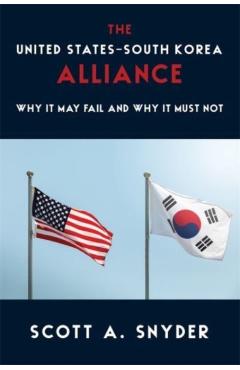South Korea at the Crossroads: Autonomy and Alliance in an Era of Rival Powers - Scott A. Snyder

Detalii South Korea at the Crossroads:
libris.ro
157.5 Lei
175 Lei
Political Science
Scott A. Snyder
South Korea at the Crossroads: - Disponibil la libris.ro
Pe YEO găsești South Korea at the Crossroads: de la Scott A. Snyder, în categoria Political Science.
Indiferent de nevoile tale, South Korea at the Crossroads: Autonomy and Alliance in an Era of Rival Powers - Scott A. Snyder din categoria Political Science îți poate aduce un echilibru perfect între calitate și preț, cu avantaje practice și moderne.
Preț: 157.5 Lei
Caracteristicile produsului South Korea at the Crossroads:
- Brand: Scott A. Snyder
- Categoria: Political Science
- Magazin: libris.ro
- Ultima actualizare: 02-11-2024 01:25:46
Comandă South Korea at the Crossroads: Online, Simplu și Rapid
Prin intermediul platformei YEO, poți comanda South Korea at the Crossroads: de la libris.ro rapid și în siguranță. Bucură-te de o experiență de cumpărături online optimizată și descoperă cele mai bune oferte actualizate constant.
Descriere magazin:
Against the backdrop of China\'s mounting influence and North Korea\'s growing nuclear capability and expanding missile arsenal, South Korea faces a set of strategic choices that will shape its economic prospects and national security. In South Korea at the Crossroads , Scott A. Snyder examines the trajectory of fifty years of South Korean foreign policy and offers predictions--and a prescription--for the future. Pairing a historical perspective with a shrewd understanding of today\'s political landscape, Snyder contends that South Korea\'s best strategy remains investing in a robust alliance with the United States. Snyder begins with South Korea\'s effort in the 1960s to offset the risk of abandonment by the United States during the Vietnam War and the subsequent crisis in the alliance during the 1970s. A series of shifts in South Korean foreign relations followed: the Nordpolitik engagement with the Soviet Union and China at the end of the Cold War; Kim Dae Jung\'s Sunshine Policy, designed to bring North Korea into the international community; trustpolitik, which sought to foster diplomacy with North Korea and Japan; and changes in South Korea\'s relationship with the United States. Despite its rise as a leader in international financial, development, and climate-change forums, South Korea will likely still require the commitment of the United States to guarantee its security. Although China is a tempting option, Snyder argues that only the United States is both credible and capable in this role. South Korea remains vulnerable relative to other regional powers in northeast Asia despite its rising profile as a middle power, and it must balance the contradiction of desirable autonomy and necessary alliance.

Produse asemănătoare
Produse marca Scott A. Snyder

The United States-South Korea Alliance: Why It May Fail and Why It Must Not - Scott A. Snyder
![]() libris.ro
libris.ro
Actualizat in 15/12/2024
184.96 Lei

South Korea at the Crossroads: Autonomy and Alliance in an Era of Rival Powers - Scott A. Snyder
![]() libris.ro
libris.ro
Actualizat in 02/11/2024
157.5 Lei